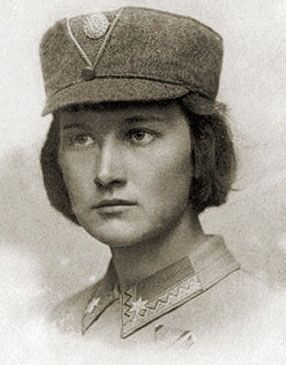THE STAGE 32 LOGLINES
Post your loglines. Get and give feedback.

SHE WARRIOR
By Aleksandr Rozhnov
She was born in an empire that denied her people. She became a soldier when women were forbidden from the front lines. Like Prometheus of her time, Olena Stepaniv brought the fire of freedom, paving the way for an entire nation — and forever changed history
SYNOPSIS:
May 1915. Intense battles rage near Ołechów between Austrian and Russian forces. Among the Austro-Hungarian ranks fights the Ukrainian Legion, led by 23-year-old Olena Stepaniv the first woman officer in Europe. Calm yet commanding, she issues precise orders and handles a rifle with skill. But the Russians vastly outnumber them. The Ukrainian soldiers are encircled and eventually captured, Stepaniv among them.
Lviv, 1948. In post-war Soviet Ukraine, 56-year-old Olena teaches geography at the university. She is reserved and stern, feared yet respected by her female students. One day, they ask her to tell her story. Hesitant at first, Olena agrees. What begins as an ordinary lecture transforms into a vivid journey through memory - war, love, captivity, and betrayal.
She recalls her early life in a priest’s family, her studies in philosophy at the University of Lviv, and her enrollment in the newly formed scouting organization "Plast." There she met Ivan Chmola, the future commander of the Ukrainian Sich Riflemen. While most girls were focused on dances and social life, Olena trained to shoot and prepared other women for war, believing that freedom requires not only dreams but weapons.
1914. With the outbreak of World War I, Olena tries to join the Ukrainian Sich Riflemen but is rejected for being a woman. She cuts her hair, disguises herself as a man under the name Oleh, and appeals to Ivan Trylovskyi, a leader of the Ukrainian paramilitary movement. He intervenes, and she is finally accepted into a unit under Chmola’s command. Her military career begins.
1915. During the fierce battles of Makivka, Olena demonstrates exceptional bravery. When commanding officers fall, she takes command. For her actions, she is awarded a military decoration and promoted to cadet - becoming the first female officer in modern history. But tougher trials await. At Ołechów, Ukrainian forces are surrounded. Though Olena commands skillfully, she is captured and exiled to Tashkent by the Russians.
Captivity is brutal. She endures solitary confinement, forced to eat scalding food in a single minute, and suffers harsh psychological isolation. Her will, stubbornness, and faith keep her alive. Thanks to efforts by the Red Cross, Countess Horn, and Austrian officer Pishel, she is released. She returns through Finland to Lviv, welcomed as a hero. She is gifted a Finnish knife, a symbol of strength.
After the war, Olena marries Roman Dashkevych, a fellow soldier, and gives birth to a son. But fate separates them. In 1941, he emigrates, leaving her in Soviet-occupied Lviv. Years later, he tries to reunite with her, but Olena, hardened by war and betrayal, refuses. She cannot forgive.
Through flashbacks interwoven with her lectures, we witness a life lived like fire resistance, imprisonment, heartbreak, and solitude. Her voice carries not just the tale of one woman, but the voice of a generation that dared to dream of an independent Ukraine long before it was fashionable.
Yet the past catches up. Soviet authorities don’t forget. Yaroslav Halan, a pro-Soviet writer and her ideological adversary, denounces her. Olena is arrested as a “bourgeois nationalist” a living symbol of resistance and sent to labor camps where she spends years working in peat bogs.
In 1956, she is released and returns to Lviv, but her body is frail and worn. She dies of cancer in 1963, without ceremony or fanfare. But her name lives on the first woman officer, a symbol of the unbreakable Ukrainian spirit, and a model for any nation of what true patriotism and the face of the fight for freedom look like.


Rated this logline
Rated this logline